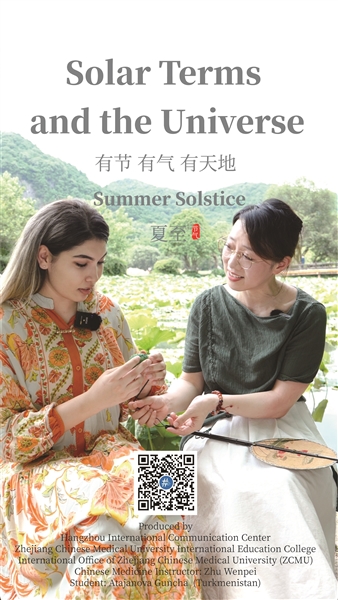
Photo: Li Yechi
Solar Terms
By Atajanova Guncha
The Summer Solstice, or “Xiazhi” in Chinese, falls on June 21 this year when the sun aligns directly with the Tropic of Cancer. This creates a 90-degree angle, resulting in the longest day of the year for the Northern Hemisphere. The Summer Solstice is rich with cultural and practical significance, deeply rooted in ancient Chinese traditions and practices.
The latest episode of the video series “Solar Terms and the Universe,” created by ZCMU and Hangzhoufeel, started with my teacher, Ms. Zhu Wenpei, introducing the Summer Solstice. She said that on this day, the Northern Hemisphere experiences its longest period of daylight. The sun’s rays hit the Tropic of Cancer at a perfect angle, making this day unique. Ancient Chinese scholars were fascinated by this phenomenon and made significant astronomical observations. Ms. Zhu explained that wise Chinese ancestors measured the length of shadows to determine the angle of sunlight. As the Chinese saying “立竿见影” (lì gān jiàn yǐng) goes, a vertically placed bamboo pole casts its shortest shadow on the Summer Solstice and its longest shadow on the Winter Solstice.
One delightful tradition of the Summer Solstice is eating noodles. But why noodles? Ms. Zhu explained that around this time, newly harvested wheat is abundant. Noodles made from this fresh wheat are not only tasty but also help prepare our bodies for the upcoming hot summer days. This practice is both symbolic and practical, aligning with the harvest cycle and providing necessary nutrition.
During the Summer Solstice period, regions like Hangzhou experience high humidity and frequent thunderstorms. This damp environment can lead to the accumulation of moisture and heat in our bodies, which can be harmful. Traditional Chinese medicine teaches us to balance these elements to stay healthy. Ms. Zhu highlights the importance of strengthening the spleen and stomach to combat “湿邪” (shī xié), the harmful effects of dampness.
She said that eating noodles, especially those made from wheat, can help with dehumidification and strengthen the digestive system. According to “A Supplement to Materia Medica,” an ancient Chinese pharmacological text, wheat noodles “nourish, enrich the skin, strengthen the stomach and intestines, and enhance strength.” She also recommended other foods like barley, water bamboo shoots, and drinks such as lotus leaf tea and black tea, which can also help reduce internal dampness.
The Chinese philosophy of health emphasizes harmony and balance. This concept is known as “the union of human and nature.” It means that to stay healthy, we should follow the natural rhythms and achieve balance both within our bodies and between our bodies and the environment. This holistic approach is especially important during the Summer Solstice. Eating seasonal foods like noodles not only honors our cultural heritage but helps us adapt to seasonal changes and maintain overall well-being.
The Summer Solstice is a time to look forward to the joys of summer. I excitedly told my teacher that I was looking forward to air conditioning, sweet watermelon, creamy ice cream, and refreshing cold showers, but she reminded me not to focus only on cooling down. Dealing with humidity and keeping our digestive system strong is equally important.
